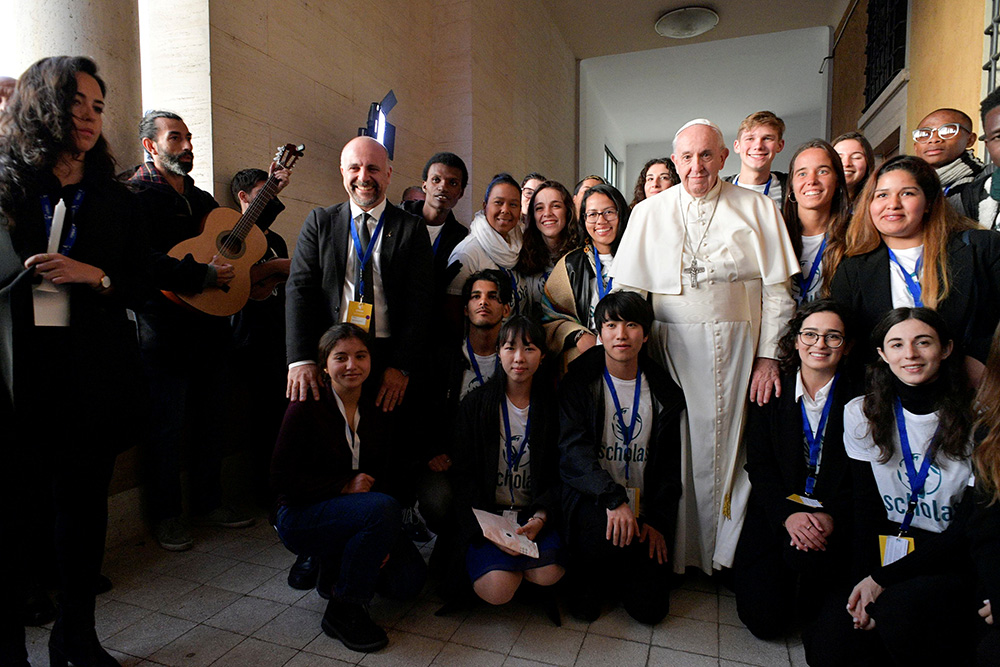
Pope Francis poses after he inaugurated the new headquarters of Scholas Occurrentes, the Vatican's foundation that works to link technology and the arts for social integration and world peace, in Rome Dec. 13, 2019. (CNS/Vatican Media)
Editor's note: Following is an abbreviated version of an address given to the Jan. 11-13 conference at the University of San Diego on "Lighting the Way Forward: The Purpose of Catholic Higher Education in a Changing World." It is published with permission.
The Catholic Church created and still runs a worldwide network of colleges and universities. In good measure, Catholicism has been identified, from the Middle Ages to today, also with the value of education and of higher education — and in modern times even more for the role the church has played and plays in the history of migrations and the need to help members of a religious, social, and ethnic minority become accepted and integrated in their new countries.
From this point of view, the relationship between the pope and Catholic colleges and universities gives us important indications on the trajectories of Catholicism, as long as we keep in mind that there is one pope in one Vatican and, on the other side, a great diversity between different kinds of Catholic colleges and universities — different in size and endowments, bylaws and statutes, theological orientations, positions within different kinds of relationship between church and state and between Catholic university system and public or state university system.
First, I will try to identify the major themes of Francis' message to Catholic colleges and universities. Then it will be necessary to insert this message in the wider context of the pontificate of the first Jesuit pope coming from Latin America. In conclusion, I will propose some reflections on what Francis' pontificate is telling us about this particular moment in church history for the role of Catholic colleges and universities.
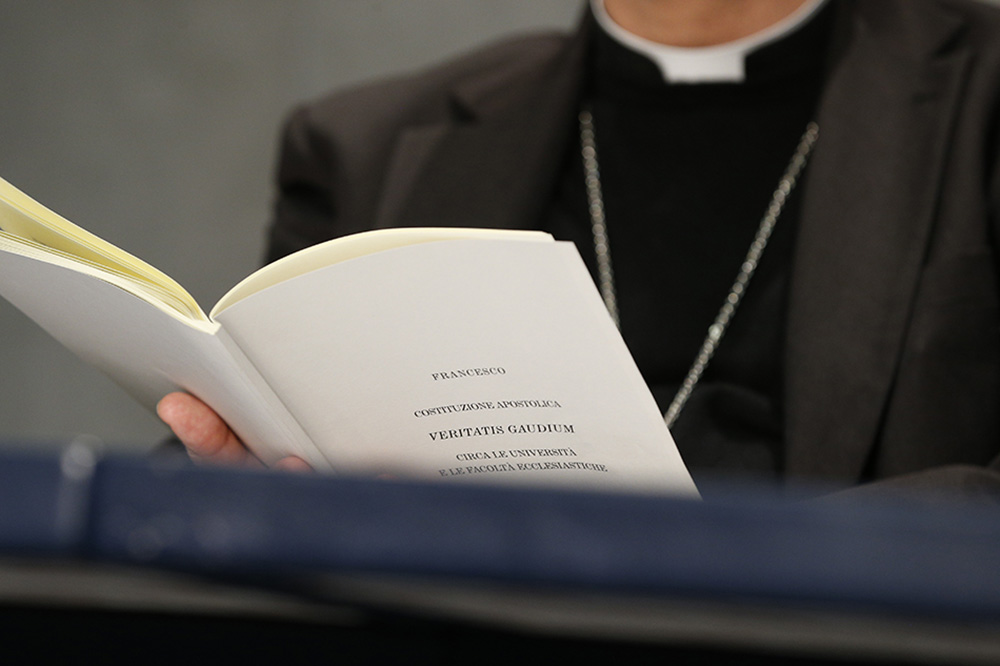
Cardinal Giuseppe Versaldi, prefect of the Congregation for Catholic Education, holds a copy of Pope Francis' apostolic constitution, "Veritatis Gaudium" (The Joy of Truth), during a news conference at the Vatican Jan. 29, 2018. (CNS/Paul Haring)
Outward-looking, at the service of a fractured world
Francis has addressed Catholic colleges and universities on multiple occasions.
One of the most important documents of Francis' pontificate is the apostolic constitution Veritatis Gaudium of Dec. 8, 2017, which is on ecclesiastical faculties and universities. In the foreword, Francis stated that "the primary need today is for the whole People of God to be ready to embark upon a new stage of 'Spirit-filled' evangelization. This calls for 'a resolute process of discernment, purification and reform.'"
This call is specific for the system of ecclesiastical studies, but much of the foreword reflects the overall vision of the role of Catholic colleges and universities "essential for a church that 'goes forth'! All the more so because today we are not only living in a time of changes but are experiencing a true epochal shift, marked by a wide-ranging 'anthropological' and 'environmental crisis.' "
Veritatis Gaudium, as specific as it is for pontifical institutions, contains the major themes of Francis' message to Catholic universities (ecclesiastical and non-ecclesiastical), one of them being the encouragement to be outward-looking universities at the service of a fractured world. As he said to the participants in the plenary of the Vatican Congregation for Catholic Education on Feb. 9, 2017:
Our world has become a global village with multiple processes of interaction, where every person belongs to humanity and shares in the hope of a better future with the entire family of peoples. At the same time, unfortunately, there are many forms of violence, poverty, exploitation, discrimination, marginalization, and approaches that restrict fundamental freedoms, creating a throwaway culture. In such a context, Catholic educational institutes are called first to put into practice the grammar of dialogue which educates in encounter and in the appreciation of cultural and religious diversities.
Francis invites Catholic colleges and universities to be part of a cultural and social process of transformation, "as a sign of a greater responsibility in relation to today's problems, the needs of the poorest, and care for the environment" and "to generate space for real research, debates that generate alternatives for today's problems," as he said to the Catholic University of Portugal on Oct. 26, 2017.
Francis emphasizes also the responsibility in keeping the idea of universitas (in Latin), "of the whole," in the life of colleges and universities, especially in Catholic higher education. In his October 2017 speech to students and faculty at Bologna (my alma mater studiorum), Francis talked about the role of the university in our divided world: "The identity to which we belong is that of a common home, of the universitas. The word universitas contains the idea of the whole and that of the community."
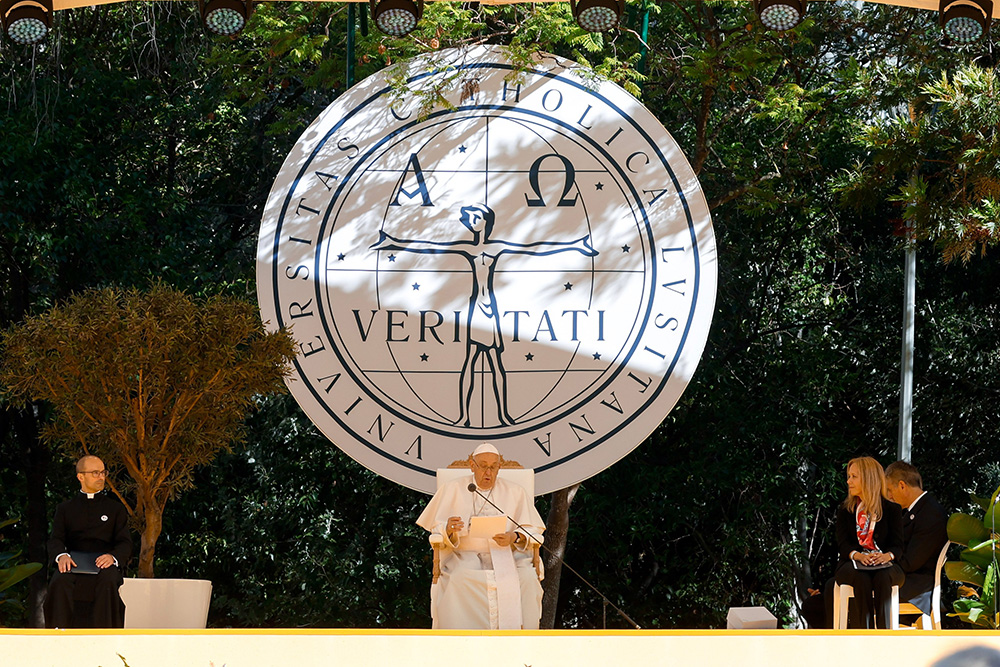
Pope Francis speaks to university students at the Catholic University of Portugal in Lisbon Aug. 3, 2023. (CNS/Lola Gomez)
Migrants, integral ecology, and the mission of the church
Within the overarching theme of an outward-looking university at the service of a fractured world, there are more specific issues that Pope Francis has addressed in his messages to Catholic colleges and universities.
One of them is the role of Catholic colleges and universities in refugee and migrant education, as he mentioned in a September 2022 address.
This view of the role of Catholic higher education in the great issues of our time is visible also in the frequent citations of his 2015 environmental encyclical Laudato Si' in his speeches to colleges and universities, for example in his speech to the October 2019 conference on "New Frontiers for University Leaders: The Future of Health and the University Ecosystem."
Universities today, Francis said, "need to consider what contribution they can and must make to the integral health of the person and to an inclusive ecology." Catholic universities, in particular, need to become places "where solutions for civil and cultural progress for individual persons and for humanity, marked by solidarity, are pursued with perseverance and professionalism," he said. Universities have "an intellectual and moral energy whose responsibility goes beyond the person to be educated and extends to the needs of all humanity."
Francis sees the mission of Catholic colleges and universities as part of the mission of the Church, in a particular way. As he said in his Feb. 25, 2023, speech to the Pontifical Universities in Rome:
The university, in fact, is the school of agreement and consonance between different voices and instruments. It's not school of uniformity: no, it is the agreement and consonance between different voices and instruments. St. John Henry Newman describes it as the place where different knowledge and perspectives express themselves in harmony, complete each other, correct each other, they balance each other. […] This harmony asks to be cultivated first of all within yourselves, between the three intelligences that vibrate in the human soul: that of the mind, that of heart and that of the hands, each with its timbre and character, and all necessary […] Especially after the Covid 19 pandemic, it is urgent to start a process that leads to an effective, stable and organic synergy between academic institutions, to better honor the specific purposes of each and to promote the universal mission of the Church.
The problem of inclusion is at the center of Francis' appeal to universities, and not just Catholic institutions. In August 2023, Francis created the Universidad del Sentido (University of Meaning), a new autonomous university that is headquartered in the Vatican and managed by the international educational organization "Scholas Occurrentes." This initiative conceives the university as a global higher-education institution responding to the need to center education around the person as an individual and the community as an expression of plurality.
Advertisement
Universities have "an intellectual and moral energy whose responsibility goes beyond the person to be educated and extends to the needs of all humanity."
Relationship with theology
One particular case is of theology in Catholic colleges and universities. Pope Francis has not engaged theologians as directly (and not as controversially) as his two predecessors who came from an academic background. But he has sent unmistakable direct and indirect messages to theologians during the entire pontificate.
Among the direct messages, there is the letter to the Grand Chancellor of the Pontificia Universidad Católica Argentina in 2015, when he wrote:
Do not settle for a desktop theology. Your place for reflection is the frontier. Do not fall into the temptation to embellish, to add fragrance, to adjust them to some degree and domesticate them. Even good theologians, like good shepherds, have the odor of the people and of the street and, by their reflection, pour oil and wine onto the wounds of mankind. Theology is an expression of a Church which is a 'field hospital', which lives her mission of salvation and healing in the world. Mercy is not just a pastoral attitude but it is the very substance of the Gospel of Jesus. I encourage you to study how the various disciplines — dogma, morality, spirituality, law, and so on — may reflect the centrality of mercy. Without mercy our theology, our law, our pastoral care run the risk of collapsing into bureaucratic narrow-mindedness or ideology, which by their nature seeks to domesticate the mystery. Understanding theology is understanding God, who is Love.
Overall, Francis has kept with academic theology a distant relationship, or has not given university theology a privileged attention, which says something about his relationship with Catholic colleges and universities altogether.
A complicated relationship between two shifting voices
Before attempting any assessment of the relationship between Pope Francis and Catholic colleges and universities, it is important to add a series of qualifying statements.
Overall, Catholic colleges and universities around the world find themselves on a wide spectrum between educational and cultural systems where:
- Religion and the Catholic Church are still a major social and cultural presence (like in the U.S.) even though not immune from secularization;
- Countries in Europe and the Americas where Catholicism went through a phase of diaspora (after the French Revolution) or in exile (because of Communism in Central and Eastern Europe), in ongoing exodus (maybe Germany today), or is returning today (like in Scandinavia) thanks to immigration and Christian initiation of adults;
- Countries in the "global south" where Catholic higher education is in part legacy of a colonial-missionary past and in part — a small part — expression of churches that are growing in the numbers of both lay faithful and members of the clergy and religious orders.
Catholic colleges and universities in the U.S. represent a very particular subset of the world of Catholic higher education in the global church:
- For their relationship with the bishops and the Vatican — at times contentious, especially in recent decades — but always assertive of their freedom;
- For their varying and sometimes diametrically opposed theologically or socially and politically "militant" Catholic cultures;
- For the role that women religious and women in general (also theologians) played in the foundation and in the life of Catholic colleges and universities;
- For the still significant core requirement of theology/philosophy/ethics/humanities courses for all students (even though declining and now in a moment of soul searching);
- Most importantly, for their presence within a very competitive system of higher education shaped by unguided and lightly regulated market forces that have engulfed the culture and its transmission, together with the dominance of producers and distributors of content that are today among the most valuable companies in the world.
In all these different situations around the world, Catholic colleges and universities (but also Catholic "centers" that have grown recently in non-Catholic institutions of higher education) have become places and hubs of connections for Catholics to find themselves and others, in ways that parishes, convents, and monasteries (let alone public schools) no longer can be.
In this complex picture, Catholic colleges and universities must still articulate the universitas but they have to do this within a world of particularities and minorities, one of them being Catholic culture and values. It's also a cultural order where everyone sees themselves as a member of a minority within the larger society, and also within their own church. Secondly, they have to articulate the universitas in a Catholic Church which is more visibly fractured also within — not only dealing as one with a fractured world.
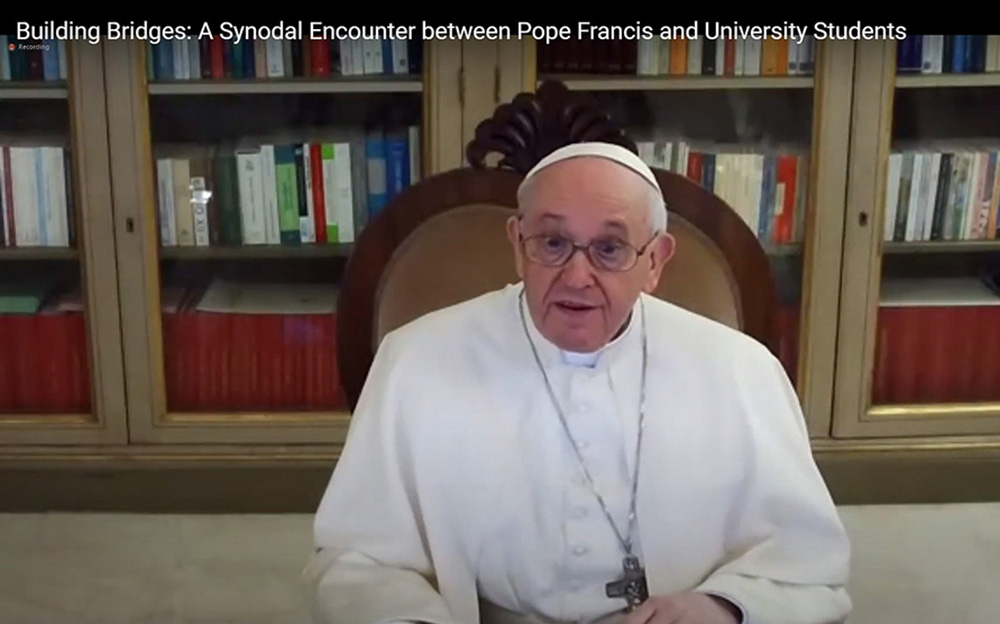
Pope Francis speaks during a virtual meeting titled "Building Bridges: A Synodal Encounter" with university students from North, Central and South America Feb. 24, 2022. The meeting was hosted by Loyola University Chicago, in partnership with the Holy See. (CNS screenshot/YouTube)
Universities and a pope for the people
My contention is that Francis' pontificate has interacted less than his predecessors with the world of universities, also because of the reluctance of Francis' anti-elitism to engage in a dialogue with Catholic academics (not just theologians). In this sense, Francis has not shown a differentiated attention between Catholic higher education and universities in general. Pope Francis' repeated and spot-on references to the risk of self-isolation and social exclusivity of academics are more than just a riff on his original insights of the Church as "a field hospital," but represent a real challenge for Catholic higher education.
The lectio facilior, that is, the simplest possible — but also simplistic — interpretation could be that this distance is typical of a pope like Jorge Mario Bergoglio, who does not come from academia, nor from the societal elite.
This is part of the truth, but I think there is more. The relationship between Francis and Catholic colleges and universities reveals the dynamics between two entities in movement, two moving objects, in different directions. This is echoed in the title of this conference: "The Purpose of Catholic Higher Education in a Changing World." The fact is that in this changing world there are also a changing papacy and a changing university system.
On the one hand, Francis' papacy has exhibited, with more intensity compared to his post-Vatican II predecessors, some of the changing features of the Roman papacy:
- An institution in sync with a Catholic Church becoming more global, and much less Western-European;
- Less magisterial and propositional, more testimonial;
- Less dogmatic, more pastoral;
- Less "high culture," more pop; and,
- Fewer direct connections with the social and political elites, more interested in bringing about social change from the bottom up.
On the other hand, all these changes in the papacy have reformulated the way in which the papacy relates to Catholic higher education, which in turn is going through enormous transformations:
- The crisis of the universitas as an idea;
- Tyranny of the market system and the disappearance of many of the small institutions of Catholic higher ed;
- The transition from the leadership of members of the clergy and religious order to lay leadership (that is, to the members of another kind of priesthood in the capitalistic system);
- The risk of watering down or even dissolution for Catholic identity;
- The contract-ualization and adjunct-ification of teaching;
- The uncertain relationship with the evangelizing mission of the church; and,
- The universities moving away from classics, but also from religion and tradition.
All this makes the distinction between Catholic higher education and non-Catholic colleges and universities relevant in a different way, or less relevant.
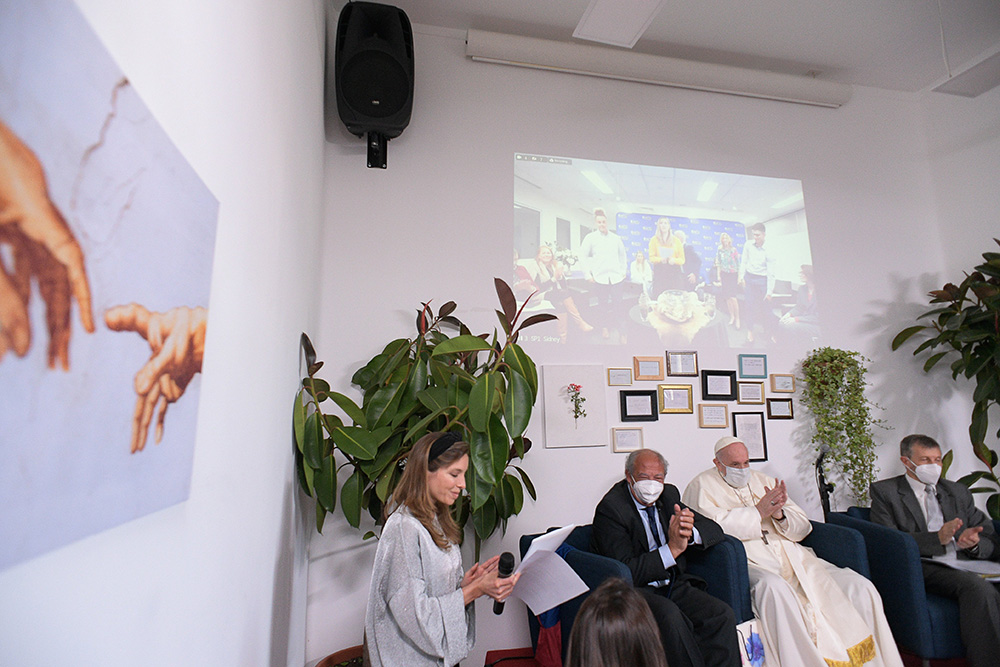
Pope Francis leads a meeting at the Scholas Occurrentes headquarters in Rome May 20, 2021. The pope was joined by video with Cardinal Wilton Gregory of Washington and students at Archbishop Carroll High School in the Archdiocese of Washington to announce the launch of a new Scholas Occurrentes chapter in the District of Columbia. (CNS/Vatican Media)
Open questions and a conclusion
Francis has made clear that the papacy — at least his papacy, except in some isolated cases — has moved away from a confrontational approach with Catholic university leadership and has given more freedom, which is also a consequence of the rise of lay leadership.
What is not clear today is how Catholic colleges and universities still see themselves with an ecclesial role, cooperating in building the Catholic tradition. The debate on the legacy of the 1967 "Land O'Lakes Statement" tends to focus on issues of Catholic "identity" and (or versus) "mission," in a political-ecclesiological framework largely centered on the issue of the relationship between Catholic institutions of higher education and the institutional Church — the papacy and the bishops.
It is clear the higher degree of freedom from the institutional church today. It is less clear how willing and able Catholic colleges and universities are to respond to the real overlord, the master of our world, that is, the market.
But it is not clear also what is the view that the papacy has of the academic world in terms of ecclesial role in the church "as a field hospital." What is the role of intellectuals, and of the formation of intellectuals, in the church seen as "a people"?
Higher education plays a role in Francis' message to transform the world, but universities are not the immediate and natural interlocutors of the pope. In this sense, Francis' papacy has captured with great depth the value of the crossroads in front of which we find ourselves.
Certainly, a deeper reception of Francis' message is needed in our institutions, at all levels — faculty, administrators, alumni, and donors. This reception would help correct some misperceptions on the ecclesial and cultural challenges facing Catholic higher education in the world of today. But this would also transform in profound and unexpected ways the future of Catholic colleges and universities.








